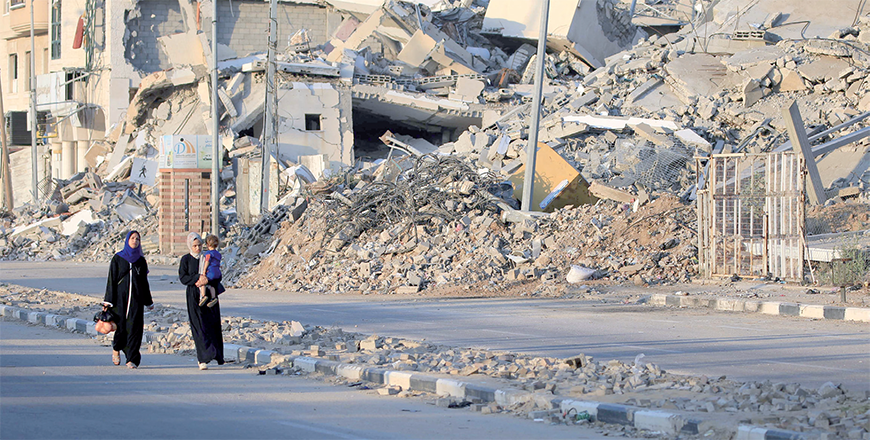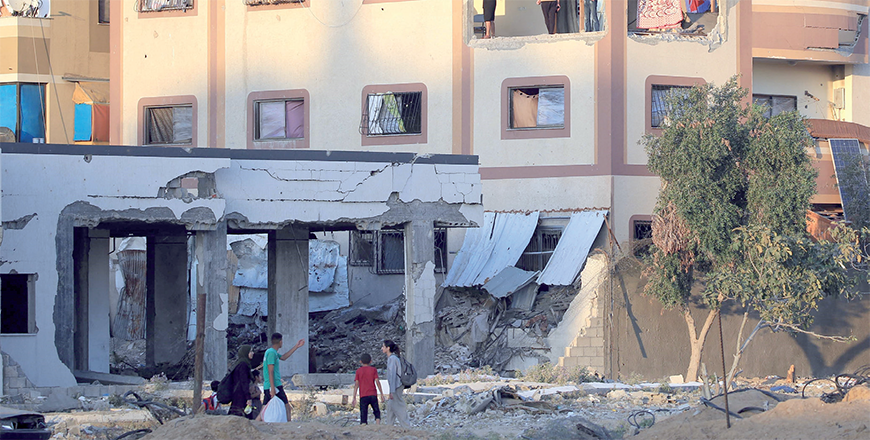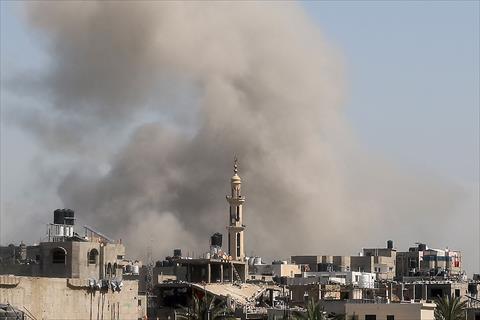You are here
Gaza war rages as US wants to 'close' truce deal
By AFP - Jun 13,2024 - Last updated at Jun 13,2024

Displaced Palestinians walk past destroyed buildings in Al Bureij refugee camp in the central Gaza Strip on Wednesday (AFP photo)
DOHA — Top US diplomat Antony Blinken said on Wednesday an elusive truce and hostage release deal to end the Gaza war was still possible, wrapping up a Middle East tour as deadly fighting rocked the Palestinian territory.
Lebanon's Iran-backed militant group Hizbollah, a Hamas ally, rained rockets on northern Israel, a day after an Israeli strike killed one of its senior commanders.
Secretary of State Blinken, in Doha for the last stop of a tour to promote President Joe Biden's Gaza ceasefire roadmap, said the United States would work with regional partners to "close the deal".
Hamas late Tuesday submitted its response to mediators Qatar and Egypt, and Blinken said some of the proposed amendments "are workable and some are not".
A senior Hamas official, Osama Hamdan, said it sought "a permanent ceasefire and complete withdrawal" of Israeli troops from Gaza, demands rejected by Israel.
The three-stage plan — endorsed by the UN Security Council and Arab powers — includes a six-week ceasefire, a hostage-prisoner exchange and Gaza's internationally backed reconstruction.
US National Security Adviser Jake Sullivan said "many" of Hamas's demands were "minor and not unanticipated", while "others differ more substantively from what was outlined in the UN Security Council resolution".
Blinken said Israel was behind the plan, but Israeli Prime Minister Benjamin Netanyahu, whose government has far-right members strongly opposed to the deal, has yet to formally endorse it.
Netanyahu's office said he was convening a "security assessment" on Wednesday "in light of the developments in the north and Hamas's negative response on the issue of the hostage release".
The top US diplomat expressed hopes that gaps could be closed.
“We have to see... over the course of the coming days whether those gaps are bridgeable,” said Blinken.
Hizbollah rockets
As the bloody Gaza war rages into its ninth month, deadly violence has intensified along Israel’s northern border with Lebanon.
An Israeli strike on Tuesday killed a Hezbollah commander described by a Lebanese military source as the Shiite Muslim group’s “most important” fighter killed in near-daily exchanges of fire between Israel and Hizbollah since the Gaza war erupted.
On Wednesday three waves of about 150 rockets and missiles filled the sky over northern Israel, according to the military, reporting fires but no casualties.
Hizbollah also claimed more than 10 other attacks on the Israeli military, including one with drones.
Senior Hizbollah official Hashem Safieddine threatened to “increase the intensity, strength, quantity and quality of our attacks”.
Netanyahu warned last week that the army was “prepared for a very intense operation” to “restore security to the north”.
In Doha, Blinken said “the best way” to help end the Hizbollah-Israel violence was “a resolution of the conflict in Gaza and getting a ceasefire”.
“That will take a tremendous amount of pressure out of the system.”
The Gaza war broke out after Hamas’ October 7 attack which resulted in the deaths of 1,194 people, mostly civilians, according to an AFP tally based on Israeli official figures.
The militants also seized 251 hostages. Of these 116 remain in Gaza, although the army says 41 of them are dead.
Israel in response launched a military offensive on Gaza that has left at least 37,202 people dead, also mostly civilians, according to the Hamas-ruled territory’s health ministry.
‘Tired, dead, destroyed’
In central Gaza’s Bureij refugee camp, resident Ahmed Al Rubi said he hoped a deal would end the “severe suffering we are going through”.
“I hope for a ceasefire,” he told AFP. “What has happened to us is enough.”
Israeli campaign group the Hostages and Missing Families Forum said Hamas’ response “represents another step towards accepting Israel’s hostage deal proposal”, referring to the Biden plan.
It urged Israel to send negotiators as soon as possible, warning “any delay may jeopardise the possibility of reaching a deal”.
Some Gazans have called on Hamas to do more to secure a deal.
“Hamas does not see that we are tired, we are dead, we are destroyed,” a Gaza man told AFP, giving his name as Abu Shaker.
“What are you waiting for?” he said. “The war must end at any cost. We cannot bear it any longer.”
Israel’s military kept up its bombardment and ground operations inside Gaza, where a witness said there was “aerial and artillery shelling” in the southern city of Rafah.
A child was killed in an Israeli bombardment targeting a Rafah house, a medic at Al Nasser Hospital said. Air strikes and shelling also hit nearby Khan Yunis.
Farther north, the civil defence agency reported at least four dead in a strike on a house in the Zeitun neighbourhood of Gaza City, where a hospital earlier said a pre-dawn raid killed seven people.
‘Starvation’
A UN investigation concluded on Wednesday that Israel has committed crimes against humanity during the Gaza war, including that of “extermination”.
It found both Israeli forces and Palestinian militants and civilians had committed war crimes.
The Commission of Inquiry, established by the UN Human Rights Council, noted “a widespread or systematic attack directed against the civilian population in Gaza” including “starvation as a method of warfare”.
Israel rejected the conclusions and accused the commission of “discrimination”.
UN Secretary-General Antonio Guterres said the conflict has seen “a unique level of destruction and a unique level of casualties in the Palestinian population during these months of war”.
The World Health Organisation (WHO) said more than 8,000 children aged under five have been treated for acute malnutrition in Gaza, where only two stabilisation centres for severely malnourished patients currently operate.
“Despite reports of increased delivery of food, there is currently no evidence that those who need it most are receiving sufficient quantity and quality of food,” said WHO chief Tedros Adhanom Ghebreyesus.
Related Articles
EL ALAMEIN — Top US diplomat Antony Blinken met Egypt's president Tuesday for talks about a Gaza ceasefire after saying Israel had accepted
GAZA STRIP, Palestinian Territories — Israeli helicopters struck Gaza's Rafah on Thursday, residents said, with Hamas fighters reporting str
Gaza City, Palestinian Territories —Hamas spokesman Basem Naim told AFP Friday that talks over a ceasefire deal between the Palestinian Isla

Opinion
Apr 09, 2025
Apr 08, 2025
- Popular
- Rated
- Commented
Apr 08, 2025
Apr 09, 2025
Newsletter
Get top stories and blog posts emailed to you each day.

















